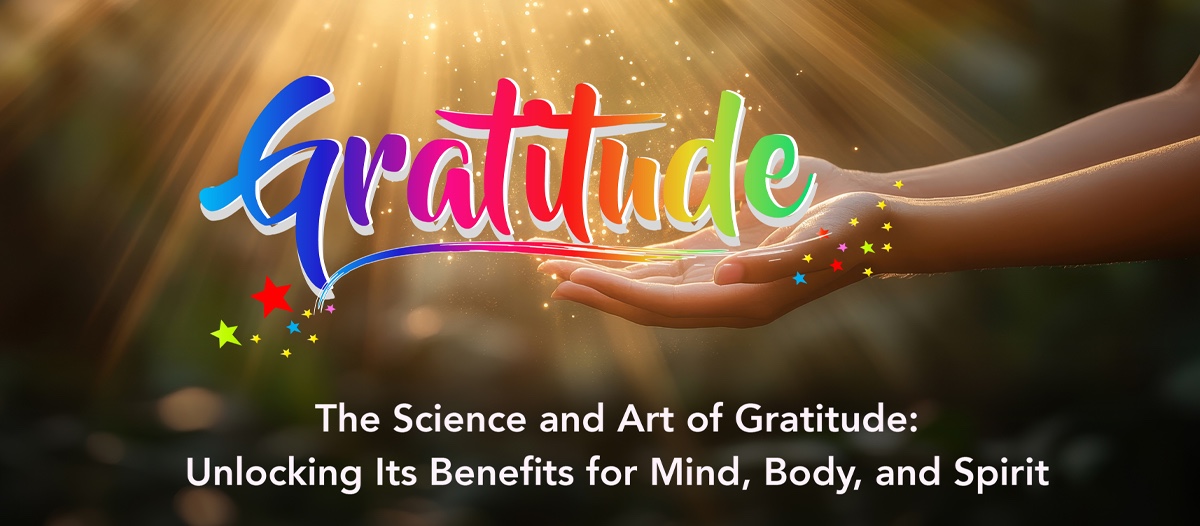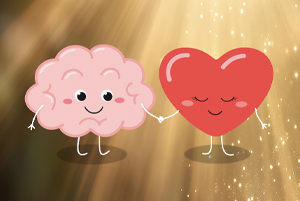The Science and Art of Gratitude:
Unlocking Its Benefits for Mind, Body, and Spirit
by Mark J Kaylor
Gratitude is more than a polite “thank you.” It is a deeply transformative practice that impacts nearly every facet of our lives. From enhancing mental health to improving physical well-being and fostering deeper social connections, gratitude serves as a cornerstone for a fulfilling life. Let’s explore the research, benefits, and actionable ways to integrate gratitude into your daily routine.
What Is Gratitude?
At its core, gratitude is the practice of recognizing and appreciating the good in life. It can be directed toward people, events, or even abstract concepts like health or nature. Gratitude can be spontaneous or cultivated intentionally, often through practices like journaling, prayer, or meditation.
Gratitude is more than an emotional response; it is a cognitive recognition of value, creating a feedback loop that reinforces positivity and mindfulness.
The Science Behind Gratitude
Neuroscience of Gratitude
Research using functional MRI (fMRI) scans reveals that gratitude activates brain regions associated with reward and pleasure, including the ventromedial prefrontal cortex and anterior cingulate cortex. Gratitude also stimulates the release of dopamine and serotonin, two neurotransmitters crucial for mood regulation and overall well-being.
Gratitude and the Heart-Brain Connection
Studies indicate that practicing gratitude can reduce stress and lower heart rate variability, suggesting a direct connection between the mind and physical heart health. This connection is often attributed to reduced cortisol levels and enhanced parasympathetic nervous system activity.
Benefits of Gratitude
Mental and Emotional Health
Gratitude is a powerful tool for enhancing emotional well-being:
Reduces Depression and Anxiety: A study published in Journal of Happiness Studies found that gratitude journaling significantly decreased symptoms of depression and anxiety.
Boosts Resilience: Grateful individuals often show greater resilience to life’s challenges, cultivating an optimistic outlook.
Increases Happiness: Regularly practicing gratitude has been shown to increase long-term satisfaction and life fulfillment.
Physical Health
Gratitude extends its reach beyond the mind to influence physical health:
Improves Sleep: Expressing gratitude before bed can enhance sleep quality by calming the mind.
Strengthens Immunity: By reducing stress hormones, gratitude may support a stronger immune system.
Reduces Inflammation: Studies link lower levels of systemic inflammation to positive emotions like gratitude.
Social Benefits
Gratitude fosters better relationships and strengthens community bonds:
Enhances Relationships: Expressing gratitude improves interpersonal relationships by increasing empathy and reducing toxic emotions like envy or resentment.
Encourages Altruism: Grateful individuals are more likely to engage in pro-social behaviors, creating a ripple effect in their communities.
Improves Workplace Culture: Gratitude at work boosts morale, increases productivity, and reduces burnout.
Spiritual and Existential Benefits
Gratitude helps us connect to something greater than ourselves:
Fosters Mindfulness: Gratitude anchors us in the present moment, enhancing mindfulness and reducing rumination.
Encourages Purpose: Recognizing what we’re grateful for can give us a sense of purpose and meaning in life.
Promotes Peace: Gratitude can inspire forgiveness, reducing internal conflict and fostering inner peace.
Practical Ways to Cultivate Gratitude
-
Gratitude Journaling
Write down three things you’re grateful for daily. Be specific; for example, instead of writing, “I’m grateful for my family,” write, “I’m grateful for the laugh I shared with my sibling today.”
-
Gratitude Letters
Write a heartfelt letter to someone who has positively impacted your life. Even if you don’t send it, the act of writing can deepen your feelings of gratitude.
-
Daily Gratitude Practice
Incorporate gratitude into your morning or evening routine. Reflect on moments of beauty, kindness, or joy from your day.
-
Mindful Gratitude Meditation
Spend 5-10 minutes meditating on the things you’re grateful for. Visualize these blessings and notice how they make you feel.
-
Gratitude Jar
Keep a jar where you and your family or friends can drop notes of gratitude. Over time, revisit these notes together for a collective boost in positivity.
-
Community Gratitude
Volunteer for causes you believe in. Giving back fosters a sense of appreciation for what you have and builds connections with others.
The Ripple Effect of Gratitude
Gratitude is contagious. When you express gratitude, you inspire others to do the same, creating a positive feedback loop that extends beyond yourself. In workplaces, families, and communities, gratitude acts as a unifying force, fostering harmony and shared joy.
Challenges to Practicing Gratitude
While gratitude comes naturally to some, it may feel forced or inauthentic to others, especially during challenging times. Here’s how to overcome barriers:
Start Small: Focus on tiny, everyday blessings, like a warm cup of tea or a kind smile.
Reframe Challenges: Look for lessons or growth opportunities in adversity.
Be Patient: Gratitude is a skill that strengthens over time.
Gratitude as a Lifestyle
Practicing gratitude is not about ignoring life’s difficulties but rather embracing its complexities with an open heart. It’s about shifting perspective from what’s lacking to what’s abundant. By integrating gratitude into your daily life, you unlock a wealth of benefits for your mental, physical, social, and spiritual well-being.
As the Roman philosopher Cicero aptly put it, “Gratitude is not only the greatest of virtues, but the parent of all others.” Let gratitude be the compass that guides you to a life of joy, fulfillment, and resilience.
Call to Action
Start your gratitude journey today. Take a moment to reflect on one thing you’re truly thankful for—and share it with someone. Together, let’s spread the power of gratitude far and wide.
References
- Emmons, R. A., & McCullough, M. E. (2003). The Psychology of Gratitude. Oxford University Press.
- Seligman, M. E. P., et al. (2005). Positive Psychology Progress: Empirical Validation of Interventions. American Psychologist.
- Wood, A. M., Froh, J. J., & Geraghty, A. W. A. (2010). Gratitude and Well-being: A Review and Theoretical Integration. Clinical Psychology Review.
- Koo, M., & Joormann, J. (2014). Writing About Life Goals Enhances Emotional Recovery From Experiments Stressors. Emotion.
Mark J. Kaylor is a passionate advocate for holistic health and natural remedies, with a focus on extending both lifespan and healthspan. As the founder of the Radiant Health Project and host of Radiant Health Podcast, Mark blends in-depth research with traditional wisdom to empower others on their journey to vibrant health. Through his writing and speaking, he shares insights into the transformative power of herbs, nutrition, and lifestyle practices.
Disclaimer: All information and results stated here is for educational and entertainment purposes only. The information mentioned here is not specific medical advice for any individual and is not intended to be used for self-diagnosis or treatment. This content should not substitute medical advice from a health professional. Always consult your health practitioner regarding any health or medical conditions.













